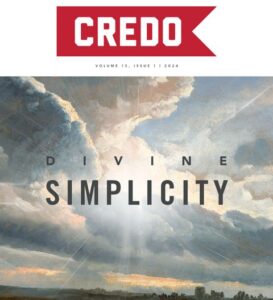One of the best questions we can ask is also the most challenging: “What is God?”[1] As the Church has searched Scripture for answers it has consistently used a surprising word to describe the divine Being: simplicity. God is simple—not in the sense of “easily understood” but as “being free from division into parts, and therefore from compositeness.”[2] God is one (Deut. 6:4); He is both unique and indivisible.
Divine simplicity is firmly embedded in the reformed confessional tradition. Click To Tweet The word simplicity, like trinity, is not found in the Bible, but reformed confessions affirm that the doctrine is biblical. The Lutheran Augsburg Confession states that “there is one Divine Essence…which is God: eternal, without body, without parts” (art. 1). Dutch Reformed believers confess the same thing: “There is a single and simple spiritual being, whom we call God” (Belgic Confession, art. 1). In the Church of England divine simplicity is taught in the Thirty-nine Articles, “There is but one living and true God, everlasting, without body, parts, or passions” (art. 1). The Westminster Assembly—which convened to modify these articles but then chose to replace them—retained the exact language of Anglicanism (Westminster Shorter Catechism 2.1), as did English Baptists (London Baptist Confession, 2.1). These confessions draw on the testimony of church fathers like Augustine, medieval theologians like Aquinas, and reformers like Calvin, Melanchthon, and Zwingli.
Divine simplicity is firmly embedded in the reformed confessional tradition. If we understand simplicity, we may come to join the doctors of the church in treasuring this doctrine.
What Is Divine Simplicity?
When God revealed Himself to Moses at the burning bush He identified Himself as being—the “I am” (Ex. 3:14). Unlike everyone else, He is not from somewhere or the fruit of ancestors. He is not even a species within a genus. Instead, He is the God who is, “the ultimate principle and …category of all things.”[3] Herman Bavinck wrote, “God is the real, the true being, the fullness of being, the sum total of all reality and perfection, the totality of being, from which all other being owes its existence.”[4] God is truly “all and in all” (Col. 3:11). Drawing from texts like these, divine simplicity maintains that in God there is “no composition, no contradiction, no tension, no process.”[5]
No Composition
He is what He has. Click To Tweet God is not a sum of parts, as we are, made up of body and soul, atoms and neurons, past, present, and future. God’s attributes do not add up to what He is. As a child I wore out a book that described a little boy’s attributes—quickness, loudness, bravery—that made him who he was. Here is the climax of the book: “Put it all together and you’ve got me!” That’s true for us. It is untrue for God. Each of God’s attributes is identical with Himself and His other perfections because each is infinite. Scripture does not merely teach that God has life, light, love, truth, and wisdom but that He is these things. He is what He has. The simple God cannot be dissected. He is pure spirit (John 4:24). Pure being.
No Contradiction or Tension
Our hearts and minds, feelings and logic, are often at odds with each other. To succeed at hard tasks our convictions must overrule our passions. The boy in my childhood story was both “as brave as a tiger” and “as shy as a shrimp.” Maintaining that balance is complicated, and we can relate. We are perpetually self-conflicted (Rom. 7:23). Some people are stronger than they are good and tend to tyranny. Others are more kind than brave; we might view them as feeble. God is not like that. God’s attributes are not parts but expressions of His whole being; they are in perfect harmony within the Godhead and shine forth in all He does. This reality is wondrously evident in the cross where God’s love, wrath, mercy, and justice harmoniously reveal His glory and accomplish gracious salvation.
No Process
God’s simplicity means that He is self-existent. He did not come into being by the combination of ingredients, and there is no potential of disintegration in Him. Similarly, He is unchangeable, He is not in process by way of decline or growth. Humans ordinarily advance in maturity and regress in extreme old age. Not so with God. “In every act, God is the being that he is and will ever be.”[6] When we describe God’s being and perfections, we are repeating God’s self-revelation to Moses: I am. God is never becoming. He simply is.
Why Does Divine Simplicity Matter?
Christian theologians embrace divine simplicity because it is biblical. It also invites us to trust in His unity, share His sufficiency, and love all of Him.
Trust in a Harmonious Trinity
We cannot rank the divine persons; they are distinct from each other but not divided from each other. They are not three parts that add up to a single godhead. John Calvin understood the name God to be “the one simple essence, comprehending three persons.”[7] In our chaos we can come to a God in whom, as the Athanasian Creed puts it, “the divinity of the Father, Son, and Holy Spirit is one, the glory equal, the majesty coeternal.” Such as the one is, so are the three. “None in this Trinity is before or after, none is greater or smaller” (arts. 6, 7, 25). We can trust one God in three equal, co-eternal persons.
Share in God’s Self-sufficiency
People like us—dependent, divided, finite, unstable, and mortal—need a God who is self-sufficient, unified, infinite, immutable, and eternal. Click To Tweet If God were a composite, then He would be dependent on a part-assembler. If He had parts they would be subject to tension and dissolution. Instead, He is Yahweh, being itself. People like us—dependent, divided, finite, unstable, and mortal—need a God who is self-sufficient, unified, infinite, immutable, and eternal. These affirmations of God, which “establish an absolute Creator-creature distinction” depend on the doctrine of divine simplicity.[8] In God we find none of our composite-creature liabilities and all the perfections found only fractionally in ourselves. There is “no one greater” than God (Heb. 6:13), nothing from whom God exists. To know God is to know Him in whom all other parts of our world hold together (Col. 1:17).
Love All of God
We are tempted to favor God’s love over His justice or the reverse. This tendency is not right. God’s attributes are not like ingredients in God, differing proportionally. His love is not like a cup of sugar compared to the teaspoon of salt that is His justice. Because of His simplicity God’s perfections do not differ in substance. His attributes are Him. They are truly distinct but never divorced. If we redefine love as unrelated to truth or holiness, then we envision a “love” foreign to God. Nor can we declare “truth”—stripped of love, and suppose it is God-like. Our truth and love must go together as God’s does (Eph. 4:15). All of God’s attributes are like so many facets by which we view his single, simple majesty.
Divine simplicity can be explored in much greater depth, but, “Believers, being illuminated by the Spirit of God, know as much concerning this attribute as is necessary to cause them to adore and glorify God, as well as to experience joy, confidence, and satisfaction.”[9]
Endnotes
[1] Westminster Shorter Catechism Q/A 4.
[2] Louis Berkhof, Systematic Theology (Grand Rapids: Eerdmans, 1941), 62.
[3] Richard A. Muller, The Divine Essence and Attributes, “Post-Reformation Reformed Dogmatics” (Grand Rapids: Baker, 2003), 3:284.
[4] Herman Bavinck, Reformed Dogmatics (Grand Rapids: Baker, 2004), 2:123.
[5] Van Brugen, The Church Says Amen: An Exposition of the Belgic Confession (Neerlandia, AB.: Inheritance Publications, 2003), 24.
[6] Michael Horton, The Christian Faith: A Systematic Theology for Pilgrims on the Way (Grand Rapids: Zondervan, 2011), 229.
[7] John Calvin, Institutes of the Christian Religion (Philadelphia: Westminster Press, 1960), 1.13.20.
[8] James Dolezal, God without Parts: Divine Simplicity and the Metaphysics of God’s Absoluteness (Eugene, OR.: Pickwick Publications, 2011), 92.
[9] Wilhelmus `a Brakel, The Christian’s Reasonable Service (Grand Rapids: Reformation Heritage Books, 1992), 1:99.
Image credit: Andrew Milligan sumo


